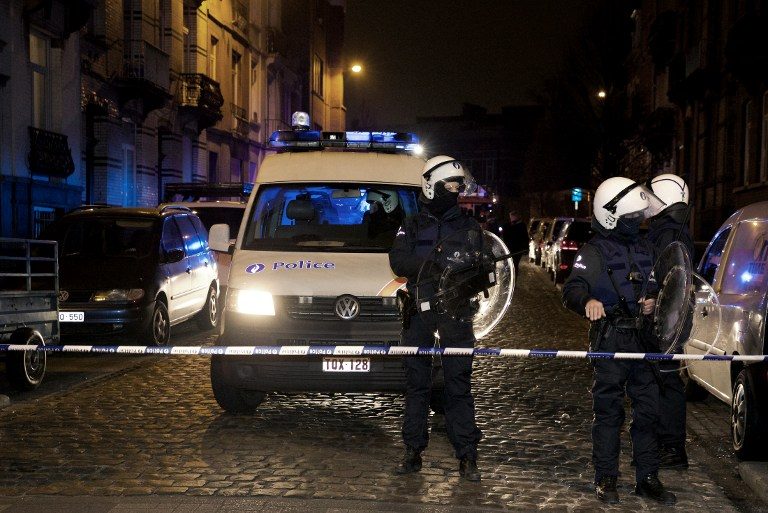SUMMARY
This is AI generated summarization, which may have errors. For context, always refer to the full article.

BRUSSELS, Belgium – Key Paris attacks suspect Salah Abdeslam will fight his extradition to France from Belgium where he was formally charged on Saturday, March 19, with “terrorist murder” after his dramatic capture in central Brussels.
French President Francois Hollande said shortly after Abdeslam’s arrest on Friday that he wanted to see him transferred to France as quickly as possible to face prosecution for the deadly attacks claimed by the Islamic State (ISIS) group.
“I can already tell you that we will oppose his extradition,” Abdeslam’s lawyer Sven Mary told reporters at federal police headquarters in Brussels.
Legal experts said this could delay but not prevent his handover to the French authorities on a European Arrest Warrant which the European Union introduced specifically to speed up extradition cases.
An investigating judge formally charged Abdeslam with “participation in terrorist murder and participation in the activities of a terrorist organization,” a prosecutors statement said.
Abdeslam’s arrest in the gritty Molenbeek neighbourhood was hailed by European and US leaders, while French Interior Minister Bernard Cazeneuve said it dealt a “major blow” to IS jihadists operating in Europe.
The 26-year-old Abdeslam, who had been on the run for 4 months, and an alleged accomplice who was captured with him were initially taken to a Brussels hospital for treatment for gunshot injuries sustained in the police raid.
In Paris, Hollande met Saturday with key cabinet ministers and security officials to discuss the next steps in the probe into the November 13 attacks that killed 130 people and wounded hundreds more.
“The operations of the past week have enabled us to incapacitate several individuals who are clearly extremely dangerous and totally determined,” Cazeneuve said after the meeting.
The aim was now “to review operations that are under way and the fight against terrorist groups in France and Europe,” a member of Hollande’s entourage said.
Hollande, who was in Brussels for an EU summit when the raid took place, described Abdeslam as “directly linked to the preparation, the organization and, unfortunately, the perpetration of these attacks”.
Abdeslam’s capture was hailed by the Belgian press as restoring the country’s honour, tarnished by perceived intelligence and police blunders before and after the attacks, which appear increasingly to have been planned and coordinated in Brussels.
Last surviving attacker
Former small-time criminal Abdeslam is believed to be the last surviving member of the 10-man jihadist team that carried out the attacks on the Bataclan concert venue, restaurants, bars and the Stade de France stadium.
He apparently fled by car to Brussels the day after the rampage, and is believed to have spent much if not all of the subsequent four months in and around the city.
Prosecutors said special forces raided a house in Molenbeek on Friday because of evidence found in an operation elsewhere in Brussels on Tuesday, in which another Paris-linked suspect died in a gun battle.
Two other suspects escaped amid intense speculation that one of them might have been Abdeslam.
One of Abdeslam’s fingerprints was found at the scene of Tuesday’s raid, which resulted in the second operation which led to his capture.
‘Sense of relief’
Investigators believe Abdeslam rented rooms in the Paris area to be used by the attackers and also hired one of the cars in which he drove the suicide bombers to the Stade de France.
He was then supposed to blow himself up but apparently backed out and an explosives-filled suicide vest was later found in Paris in an area where mobile phone signals indicated he had been.
Police believe he fled across the border the next morning. Several people have been arrested on suspicion of helping him and his fingerprints were found in December at different Brussels apartments.
The ringleader of the attacks, ISIS member Abdelhamid Abaaoud, and attacker Bilal Hadfi, both dead, also had links to Molenbeek, which has been seen as a hotbed of Islamist radicalism for decades.
Abdeslam and his brother Brahim, who blew himself up during the Paris assault, had run a bar in the area until it was shut down by the authorities a few weeks before the attacks.
Brahim Abdeslam was buried discreetly in a Brussels cemetery on Thursday.
Abdeslam’s family feels a “sense of relief” over his arrest because he was captured alive and pressure to help find him is lifted, a family lawyer said.
Interpol on Saturday urged “extra vigilance at border controls” to ensure that any Abdeslam accomplice does not try to flee Europe. – Bryan McManus and Lachlan Carmichael, AFP/Rappler.com
Add a comment
How does this make you feel?
There are no comments yet. Add your comment to start the conversation.